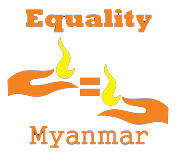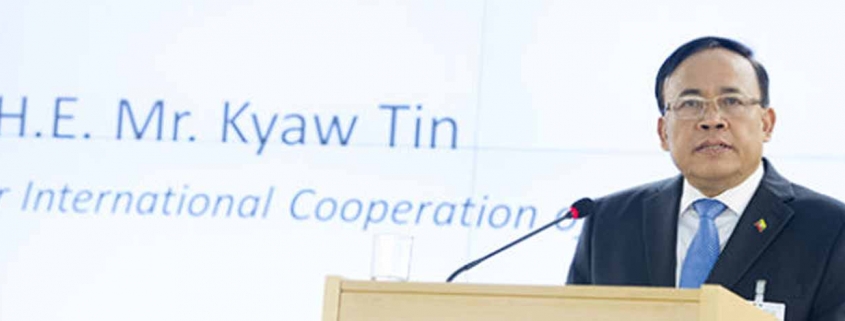Union Minister for International Cooperation U Kyaw Tin attended the High Level Segment of the 40th Session of the United Nations Human Rights Council held in Geneva from 25 to 27 February and delivered a Statement on 26 February 2019.
In his Statement, the Union Ministerapprised the meeting of the importance of guiding principles to which the Human Rights Council should adhere to, progress and challenges in the efforts of Myanmar Government for peace and national reconciliation, development,promotion and protection of human rights, resolving the issues in Rakhine State and cooperation with the United Nations in promoting human rights.
At the meeting, he stressed that promotion and protection of human rights can be achieved through dialogue, constructive engagement and cooperation instead of confrontation and condemnation. Every independent mandate holder or mechanism created by the Council should strictly adhere to the principles of independence, impartiality and integrity. Everyone must also be held accountable for what they say or report.
The Union Minister underlined the need to recognize the primary responsibility of a sovereign state in realisation of human rights for its own people and to take into consideration of each nation’s particular circumstances such as its own historical and cultural background, capacity constraints as well as other challenges and complexities facing the individual country.
The Union Minister apprised the meeting that the people of Myanmar have started to enjoy the greater freedom and democratic rights and there are visible improvements in health, education, and socio-economic sectors since the emergence of a democratically elected civilian government. They will be reinforced by the on-going implementation of the Myanmar Sustainable Development Plan-MSDP. He also added that with a view to protecting the democratic rights of the people,a joint parliamentary committee has been formed by the ruling party to amend the undemocratic provisions of the Constitution.
With regard to peace and national reconciliation, the Union Minister further informed the Meeting of the successful holding of 3 sessions of the Union Peace Conference/21st Century Panglong Conference resulting in agreement on 51 basic principles to build a Democratic Federal Union. He also mentioned that ten EAOs have already signed the NCA and the Government is redoubling its efforts to bring all on board. The Union Minister also informed about the announcement of a four month cessation of its region wise military operations in Kachin and Shan States by the Tatmataw since 21 December 2018, and the recent outbreak of fightings in northern Rakhine State ignited by the attacks of AA insurgents that has even further complicated the situation and highlighted the urgent need to make the peace process a success. “Ending of armed conflicts will not only pave the way for development, but also bring an end to conflict-related violation of human rights”, he said.
On the issue of Rakhine State, the Union Minister said that Myanmar is still facing numerous challenges in its delicate democratic transition which needs the continued support of the international community.Sadly, the world’s attention is narrowly focused only on the negative aspects related to the issue in northern Rakhine State which was wrongfully portrayed as an issue of religious persecution by the massive media campaign launching against Myanmar.
He explained that it is neither an issue of religious persecution nor inter-religious conflict. But it is, in fact, a political and economic issue involving prolonged cross-border illegal migration since colonial time, poverty and lack of rule of law and national security. Regardless of events of northern Rakhine State, Myanmar is a multi-religious country where different faiths including majority of Muslim population live in harmony throughout the country.
While sharing Myanmar’s concern over the plight of all affected communities in Rakhine State due to the violence ignited by provocative coordinated attacks of ARSA against multiple security outposts in October 2016 and August 2017, the Union Minister pointed out that the seeds of fear sown by the ARSA led to massive displacement of people. He reminded that all unlawful violence committed by any side must be condemned.
He added that the Government is fully committed to find a sustainable solution that would lead to peace, stability and development for all people in Rakhine State. The Government is implementing a vast majority of the recommendations of the Kofi Annan Advisory Commission and working on an action plan to implement five priority areas covering issues of citizenship, freedom of movement, closure of IDP camps, education and health.
“The most pressing task today is to focus on nothing but commencing the repatriation process soonest to resolve the humanitarian situation” in Rakhine State, he said by reiterating Myanmar’s readiness to receive the verified returnees in a voluntary, safe and dignified manner in accordance with the bilateral arrangements reached with Bangladesh in November 2017.
In order to create conducive environment for the returnees, the Union Minister explained that the Government is working not only with UNDP and UNHCR, but also with its ASEAN friends and regional partners, and also mobilizing funds from public, private and the people through UEHRD. Recently, the Rakhine State Investment Fair was held to generate job opportunities, income and long term development. He stressed, “Development is the best recipe for ending the communal conflicts.”
On the other hand, Union Minister U Kyaw Tin reiterated Myanmar’s firm position that the Government has categorically objected to the Fact Finding Mission (FFM) since its establishment, as well as its narrative-based report for a number of reasons including its mandate’s exclusion of investigations on violations committed by ARSA, its full adherence to the stories of Muslim displaced persons while rejecting any contradicting evidence, ignorance of the reports revealing the massacres by the ARSA and its political motivation, and the conclusions of the report are politically motivated and not supported by credible evidences.
He also shared the information on the progress of the works of the Independent Commission of Enquiry (ICOE) and its Evidence Collection and Verification Team (ECVT). He reaffirmed that the Government is willing and able to address the accountability issue. Hence,he reiterated Myanmar’sstrong rejection to any move to bring the issue of Rakhine State to international judicial system.
With regard to protecting and promoting human rights in Myanmar, he apprised the meeting of the significant steps taken by the Government, especially for its children, women, persons with disabilities and other vulnerable groups. Myanmar has already ratified 4 international core human rights treaties, namely CRC, CEDAW, CRPD, and ICESCR and signed the OPAC—Optional Protocol to the CRC on the Involvement of Children in Armed Conflict. This year, the Government has set a target to ratify the OPAC and to sign the ICCPR -International Covenant on Civil and Political Rights. Being a strong supporter for the UPR mechanism, Myanmar will be submitting the 3rd national report under the UPR process in 2020. The Government is taking steps to enact legislations including the new Child Rights Law, and draft laws to address the issues of hate speech as well as violence against women.
There have been a number of visits to Myanmar paid by the Special Envoy of the Secretary General, the Special Representative for Sexual Violence in Conflict, and the Special Representative for Children and Armed Conflicts.
The Union Minister further informed the Meeting that the Government has established a National Committee in January to prevent the issue of 6 grave violations relating to the children and armed conflict. It will also set up a national committee and draw up a national action plan to implement the Joint Communiqué that Myanmar had signed with the Special Representative for Sexual Violence in Conflict last December. Also in the bilateral context, Myanmar is holding human rights dialogues with the European Union, Japan and the United States.
He pointed out that Myanmar has been unfairly targeted and disproportionately put under special scrutiny by multiple mechanisms of the UN despite those positive developments in the country.
He further explained the reasons for Myanmar’s rejection to the UN resolutions for setting up the planned establishment of Independent Investigative Mechanism (IIM): it was established beyond the Human Rights Council’s mandate and its Terms of References (TOR) is also very intrusive on the sovereignty of Myanmar; it would only serve political ambition of those who wish to exploit the Council for their political agenda; the funding arrangement which allow additional non-budgetary resources will severely affect independence and impartiality; anda more than 26 million US Dollar budget allocation and recruitment of 62 staff headed by an ASG to monitor a country through this mechanism would be wasting the scarce resources of the United Nations.
In conclusion, the Union Minister stressed that the Government is making every effort to further advance peace, democracy and development. Despite numerous challenges and constraints, Myanmar will do its best to take its primary responsibility to promote and protect the fundamental human rights of all people without losing sight of the country’s future. The Government is only seeking for fairness in the approach of the international community in addressing the challenges. He also urged the Council to make careful examination of the complete and objective information before taking any important judgment or policy decision on issues at hand.
He conveyed his appreciation for the support of many friends and partners to Myanmar in various ways and welcomed their constructive cooperation in helping Myanmar resolve the complex and delicate issue.
About Us
 Equality Myanmar (EQMM) is a leading nongovernmental organization that organises a wide range of human rights education and advocacy programs, the documentation human rights violations, and provides emergency support for activists, human rights defenders, and their families. We work with a range of local civil society organizations, educators, activists, various local actors, and our programs and activities reach all states and regions in Myanmar.
Equality Myanmar (EQMM) is a leading nongovernmental organization that organises a wide range of human rights education and advocacy programs, the documentation human rights violations, and provides emergency support for activists, human rights defenders, and their families. We work with a range of local civil society organizations, educators, activists, various local actors, and our programs and activities reach all states and regions in Myanmar.
Equality Myanmar stands strong for professional commitment, despite the organization having faced a critical situation in 2021 due to the political crisis.
Business Hours
Our support Hotline is available 24 Hours a day: (555) 343 456 7891
- Monday-Friday: 9am to 5pm
- Saturday: 10am to 2pm
- Sunday: Closed
Our Office Hours
Mo-Fr: 8:00-19:00
Sa: 8:00-14:00
So: closed



